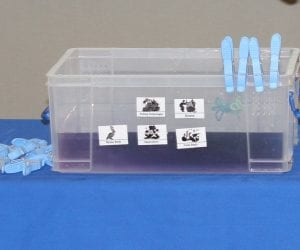This year on Earth Day we are called to help end the widespread plastic pollution on our planet. This problem is particularly prevalent in the oceans, where about 8.8 million tons of plastic ends up every year. That’s like a garbage truck dumping a full load of plastic into the ocean every minute.
The vast amounts of plastic in Earth’s oceans are continuously sucked into giant, floating garbage patches formed by large-scale surface currents called gyres. Nowhere on Earth is our plastic pollution more visible; it is literally a sea of plastic.
Solutions to Contribute to Plastic-free Oceans
Let’s talk about how we’re going to clean this up! There are innovative, passionate people all around the world working on achieving plastic-free oceans and keeping them that way. Let’s explore some of these solutions, and discuss what each of us can do to contribute to plastic-free oceans.
1. Cleaning up the Gyres
If we leave all that plastic floating around it will continue to wreak havoc on marine ecosystems, not to mention represent humanity’s gross environmental negligence. But fear not, there’s a brilliant 23-year-old inventor who’s working to clean up our mess. I’m talking about Boylan Slat, who plans to drastically reduce the amount of plastic in the oceans using giant floating trawls or nets. He’s like a Dutch Steve Jobs, except instead of sleek user-friendly personal computers with fruit inspired logos, Boylan is developing technology that literally saves oceans from plastic. His organization, The Ocean Cleanup, is designing trawls to autonomously roam the seas capturing floating plastic debris big and small, using energy from the sun, waves and currents to power the cleanup. The idea is that these giant trawls will collect the plastic which large cargo vessels will later transport back to land for recycling. Boylan claims that with multiple units operating simultaneously across the oceans, they can clean up 50% of the patches in five years. And that’s just to start.
2. Stopping Plastics at the Source
Taking plastic out of Earth’s oceans doesn’t solve the problem completely. We also need to stop the plastic and garbage from getting there in the first place, and keep our oceans clean. The reason so much trash ends up in the oceans is often because of inadequate waste management systems worldwide. Here in the United States, we take for granted the virtual ubiquity of curbside trash and recycling pick up services. What would you do without them? Travel for hours to the closest landfill with your trash? Throw it into a communal dump or out onto the street? It’s estimated that more than 3 billion people don’t have easy access to safe waste collection or disposal. At the national and international levels, improving waste management systems has to be a high priority. The United Nations’ Global Partnership on Waste Management brings together NGOs, governments, businesses, localities, and academics to address gaps in waste management services and infrastructure around the world.
Changing laws and standards can make a big difference, too. Governments and organizations are outlawing, replacing, or taxing unrecyclable packaging and bags, as well as providing information to consumers on alternatives. The city of Seattle will start banning plastic straws and utensils to curb single-use plastic consumption beginning in July of 2018 (“Strawless in Seattle”). Plastic water bottle bans are spreading across the country, often at universities like Washington University in St. Louis, the University of Vermont, and many more “ban the bottle” locations.
3. Smarter Consumption and Community Action
Achieving plastic-free oceans is also up to us. You and me. You and me and our families and our schools and my next door neighbor Zack and even his corgi Bowser. We all have a big part to play in keeping Earth’s oceans clean. We can live our lives with less plastic by doing simple, everyday actions:
- Carry a reusable water bottle and don’t buy plastic bottles. Seven out of every 10 plastic water bottles are thrown in the trash.
- Refuse disposable straws wherever you are: the U.S. alone uses 500 million straws a day, none of which are recyclable and all of which pose a serious threat to marine animals.
- Bring your own shopping bags to the store to cut down on the use of plastic bags.
- Buy in bulk and try to avoid buying too many things online (ahem, on Amazon) to reduce the amount of packaging you use.
- Keep a reusable spork or set of utensils in your bag, backpack, purse, satchel, or tote to avoid single-use plastic implements.
Talking Plastic Pollution to Make a Difference
Your voice and your actions count, they influence your friends and family and encourage them to do the right thing. There is a rising tide of individuals and communities taking action on plastic pollution, whether that’s organizing beach and town clean ups, contacting representatives about the plastics problem, or taking the #CleanSeas pledge. Named for the floating garbage patches previously mentioned, the group 5 Gyres can help you and your class learn even more about plastic pollution, and how you can all be involved in the solution.



